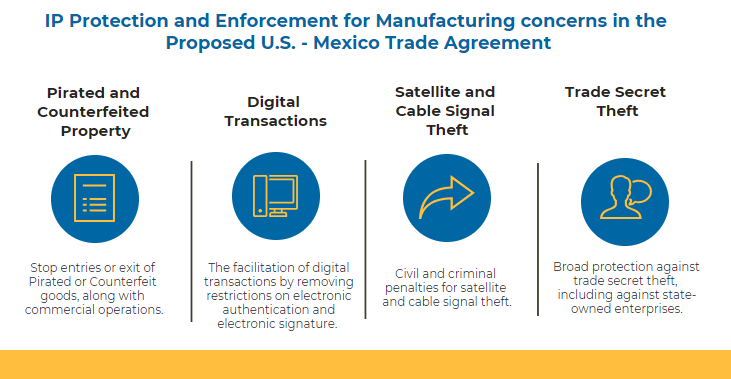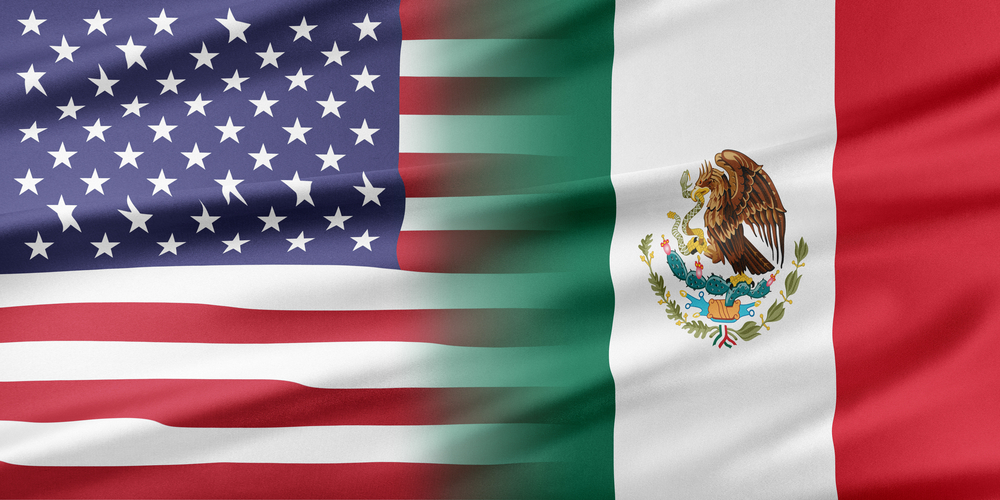Mexico is a well known global collaborator in trade, culture, and research initiatives. For this reason, Intellectual Property Rights are protected at any means necessary. As an international partner in trade, Mexico has a history of participating in many international FTAs that promote IP protection. Specifically, Mexico is part of the Universal Copyright Convention and the Berne Convention where foreigners are guaranteed protection for their work.
U.S. - Mexico Trade Agreement: IP Protection
Currently, NAFTA has a Trade Related Aspects of Intellectual Property Rights (TRIPS-Plus) that was first initiated by the World Trade Organization (WTO) in 1995. TRIPS-Plus sets high standard and guidelines for patents in WTO countries, extending terms longer than the 20 year minimum, restricting generic competition, or limiting the use of compulsory licenses. One other addition to the TRIPS-Plus is the protection of data exclusivity, specifically for pharmaceutical test data.
The new agreement between the U.S. and Mexico contains a modernized and strong chapter on Intellectual Property Protection. The modern approach would apply standard enforcement of the trade provisions including criminalization. Both countries agreed that the standards of the new treaty should cover piracy, counterfeiting, camcording, trade secret theft, and some signal thefts.
The Fact Sheet put out by the Office of The U.S. Trade Representative states:
"For the first time, a trade agreement will require all of the following:
- Enforcement authorities must be able to stop goods that are suspected of being pirated or counterfeited at all areas of entry and exit.
- Enforcement against counterfeits and piracy occurring on a commercial scale.
- Meaningful criminal procedures and penalties for camcording of movies.
- Civil and criminal penalties for satellite and cable signal theft.
- Broad protection against trade secret theft, including against state-owned enterprises."
As for digital trade within the same IP Protection chapter, the new agreement states that it will:
- "Prohibit customs duties and other discriminatory measures from being applied to digital products distributed electronically (e-books, videos, music, software, games, etc.).
- Ensure that suppliers are not restricted in their use of electronic authentication or electronic signatures, thereby facilitating digital transactions.
- Guarantee that enforceable consumer protections, including for privacy and unsolicited communications, apply to the digital marketplace.
- Limit governments’ ability to require disclosure of proprietary computer source code and algorithms, to better protect the competitiveness of digital suppliers."
Mexico’s Global Intellectual Property Network
As a World Intellectual Property Organization member, Mexico follows various agreements and treaties on Intellectual Property, some that deal with industry include:-
Paris Convention for the Protection of Industrial Property, 1903
- Lisbon Agreement for the Protection of Appellations of Origin and their International Registration, 1966
- Mexico-Chile FTA, 1999
-
Trademark Law Treaty, 1994
-
Patent Cooperation Treaty, 1995
- Nice Agreement Concerning the International Classification of Goods and Services for the Purposes of the Registration of Marks, 2001
- Vienna Agreement Establishing an International Classification of the Figurative Elements of Marks, 2001
- Strasbourg Agreement Concerning the International Patent Classification, 2001
- Locarno Agreement Establishing an International Classification for Industrial Designs, 2001
- Mexico-Uruguay FT, 2004
-
Singapore Treaty on the Law of Trademarks, 2006
-
Mexico-Colombia FTA, 2011
-
Protocol Relating to the Madrid Agreement Concerning the International Registration of Marks, 2013
- Mexico-Panama FTA, 2015
The partnerships and global treaties that have enabled Mexico to be known as a safe place for industry intellectual property rights continue to grow as more emphasis is being put on modernized ways to deal with IP protection. The new and improved proposal that protects these rights is just one more reason why manufacturers should trust their operational journey in Mexico.
Subscribe
Sign up and stay informed with tips, updates, and best practices for manufacturing in Mexico.








